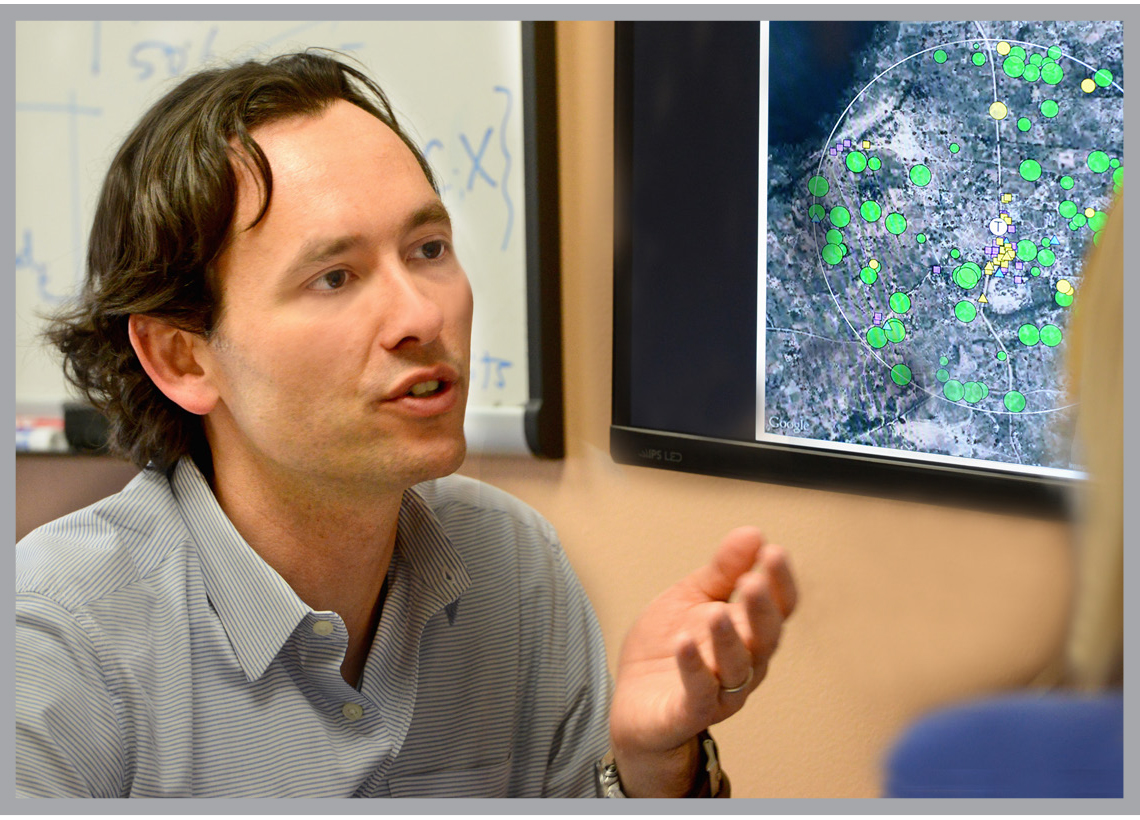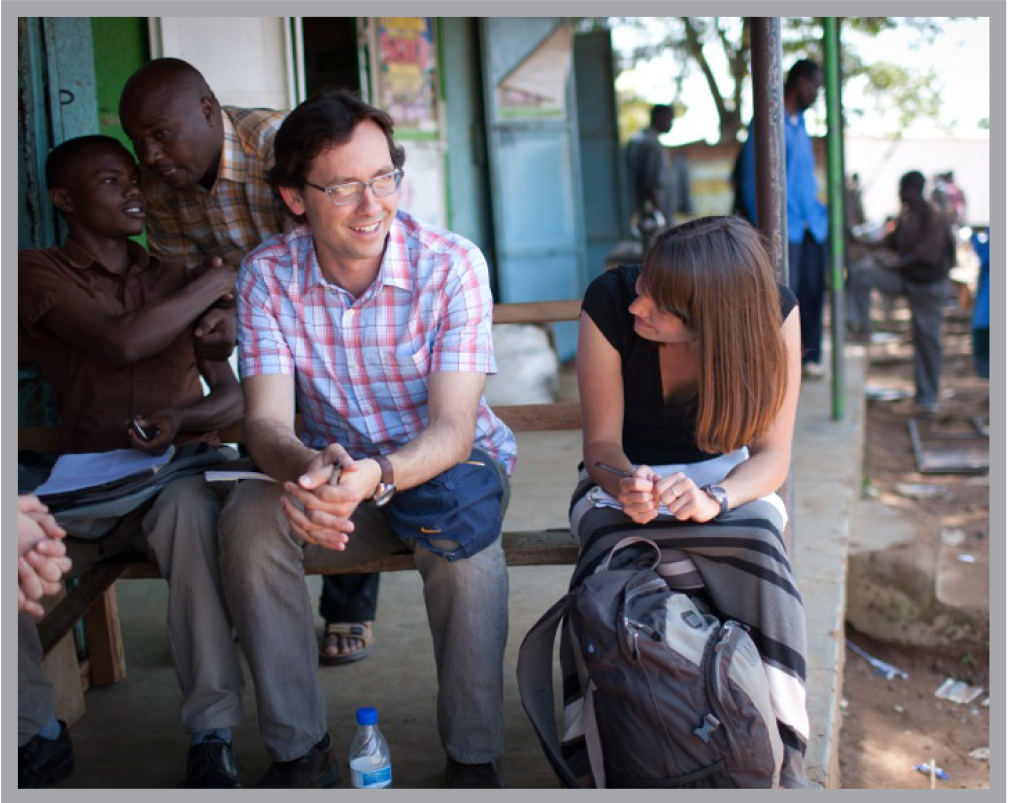The Economics of Change
The ice dispenser plops a few cubes into your glass, and you resume clicking away on your tablet. The room temperature hits 74 degrees, and the AC kicks in with a rush. Familiar enough sounds in Berkeley or Boston or Baton Rouge. But not so in many rural towns and villages, from Mexican mountain enclaves to the plains of Africa.
More than a billion people in the developing world still lack electricity at home, let alone an internet connection. Many regional governments and utility providers lack the information and infrastructure to wire up scattered populations.

Through fieldwork in Africa and India, economist Edward Miguel has studied the technological and social forces that hold back economic development, education and health. Along with colleagues and students in computer science, electrical engineering and in the business school, he helped launch a project to electrify rural communities — to literally empower rural communities in the developing world.
The Rural Electric Power Project began with pilots to test the feasibility of using AC solar microgrids (originally designed by engineers at UC Berkeley) to power clusters of rural households. This seemed like a promising solution in an area where less than five percent of households were hooked up to an electrical grid. For the other 95 percent: no refrigerators, no electric heat, no lights at night.
Team members developed protoype “microgrids” that could power separate clusters of homes without needing to access a main grid. The project began with seed funds from the Philomathia Center, established at UC Berkeley in 2012 with support from the Philomathia Foundation. The center supports a range of innovative Berkeley programs in energy and climate research.
Once on the ground in Kenya, the researchers found to their surprise that most communities in the region that lacked power were actually located under the national power grid, within a quarter mile of an electrical transformer, but were not connected to it. They calculated that it would cost less to connect all the homes to the close–by national grid than to supply new solar microgrids, and recommended this approach to Kenyan and international policymakers from Nairobi to Washington, D.C.
“The Kenya case we are studying can help us understand broader questions about the role of electrification in economic development — an issue that is on the top of the policy agenda for most African countries,” says Miguel, the Oxfam Professor of Environmental and Resource Economics at Berkeley. The innovative microgrid strategy may be an appropriate solution for other rural areas around the globe — especially ones that are relatively far from the existing grid.

The benefits of electrification depend as much on economic and cultural forces as it does on new technology. Miguel and his collaborators are conducting surveys in these rural areas to help determine what people are able and willing to pay for electric power, and if the need is concentrated in a relatively small area, or scattered. Answers are essential in order to take advantage of economies of scale in electrification, Miguel says.
The project also offers him a chance to study the impact of electrification on households. “We want to learn how providing power changes the family. “Do you buy a TV or refrigerator, or a computer? Do kids study more at home? Does the family manage its income differently? Maybe when they get electricity, more some people start small businesses.
“There are many question about how this might change life in Africa. The details really matter.”
Miguel’s interest in the forces behind social change has led him to a powerful analysis of research that ties human conflict to climate change. He and his economics colleagues Marshall Burke at Stanford and Berkeley’s Sol Hsiang reviewed what they considered the 60 most rigorous quantitative studies bearing on the possible connections. They drew on studies from many fields using data spanning centuries and five continents.
They applied statistical tools to analyze research ranging from anthropology and agriculture to climate science and economics. Their one–of–a–kind synthesis, first published in a 2013 paper in the journal Science, shows strong and disturbing correlations between rising temperatures and spikes in both regional upheaval and localized crime. Other papers have followed, and Miguel has presented the group’s findings in a 2014 “TED” talk.
Miguel is concerned about what many see as the “credibility problem” of social science research. Because the research questions can be so immediate and contentious — the effect of wages on employment levels, for example — social scientists are at risk of reading their own prejudices into their data, he says.
“There is a widespread view that much research in this area, particularly in economics, is not as credible as authors make it out to be. Most people are trying to do the right thing, but they can easily push beyond what their analysis warrants, or they may be tempted to write up their findings in a way that gets more attention.”
In 2013, he co–founded the Berkeley Initiative for Transparency in the Social Sciences (BITSS) to address the problem. The initiative aims to advance more responsible research methodologies, educate graduate students about the inherent risks of bias, and air concerns directly through professional organizations.
Miguel champions “pre–registration of hypotheses” — clearly defining hypotheses and data analysis methods at a study’s outset. Another “must–do”: publishing all relevant data. “If you have clearly identified your hypotheses, then you’re less likely to see patterns in the data that aren’t really there,” he says. “And if you publish the data, materials and statistical code that you used, other scholars can check the data and the conclusions. That is how science works.”
He teaches a graduate course focusing on research “transparency methods” for Ph.D. social science students throughout the Berkeley campus — the first course of its kind anywhere. “By shaping research practices and expectations of the next generation of scholars here at Cal,” Miguel says, “we hope to make future research more accurate, transparent and credible.”
Additional Information
The Philomathia Center plays a key role in advancing UC Berkeley’s innovative research programs in energy and climate research. Established in 2012, the Philomathia Center represents the enduring partnership between UC Berkeley and the Philomathia Foundation in support of a common vision of improving humankind through the creative application of technology, independent thinking, and a commitment to education.
To learn more: philomathia.berkeley.edu.
Research profile for Edward Miguel
